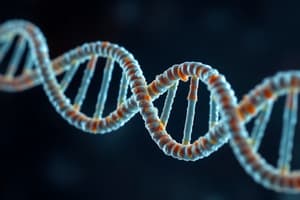Podcast
Questions and Answers
What is the role of mitochondria in a cell?
What is the role of mitochondria in a cell?
- Protein synthesis
- Energy production (correct)
- Waste elimination
- Cell reproduction
What is the primary function of chloroplasts in plants?
What is the primary function of chloroplasts in plants?
- Photosynthesis (correct)
- Cell division
- Oxygen transportation
- DNA replication
Which molecule serves as the blueprint for all life forms on Earth?
Which molecule serves as the blueprint for all life forms on Earth?
- RNA
- Carbohydrate
- Protein
- DNA (correct)
What is the main goal of taxonomists when classifying living beings?
What is the main goal of taxonomists when classifying living beings?
Which organelle is responsible for protein synthesis in a cell?
Which organelle is responsible for protein synthesis in a cell?
How does understanding DNA help in analyzing evolutionary relationships among species?
How does understanding DNA help in analyzing evolutionary relationships among species?
What is the main focus of ecologists when examining ecosystem interactions?
What is the main focus of ecologists when examining ecosystem interactions?
How does natural selection contribute to the process of evolution?
How does natural selection contribute to the process of evolution?
What is one of the key insights gained from studying ecological networks?
What is one of the key insights gained from studying ecological networks?
Why is the concept of mutualism important in ecology?
Why is the concept of mutualism important in ecology?
In the context of evolution, what does 'fitness' refer to?
In the context of evolution, what does 'fitness' refer to?
How do conservation efforts benefit from understanding ecological networks?
How do conservation efforts benefit from understanding ecological networks?
Study Notes
Exploring Science Through Biology's Lens
Biology is one of the most fascinating branches of science, delving into life's intricate complexities while answering fundamental questions about living organisms. To better understand this foundational field within our broader scientific landscape, let's explore some key aspects of biological study.
Life’s Building Blocks: Cells
Cellular structures, often called the building blocks of life, form the basic unit of all organic matter. Each cell contains many specialized parts performing various functions essential for survival. For instance, cells possess organelles like mitochondria responsible for energy production and chloroplasts that facilitate photosynthesis in plants and algae.
DNA: Nature's Instruction Manual
DNA, or deoxyribonucleic acid, serves as the blueprint for all life forms on Earth. It carries genetic information from generation to generation, defining traits passed down through inheritance. Understanding DNA has allowed scientists to analyze evolutionary relationships among species and address challenging medical problems such as inherited diseases.
Diversity: Classification and Taxonomy
Taxonomists classify living beings based on shared characteristics, ultimately leading to hierarchical groupings referred to as taxa. This process allows us to organize organisms according to their genetic makeup and physical attributes, providing insights into the history of life itself. By understanding classification systems, we can appreciate the complexity present in nature's biodiverse array.
Ecological Networks: Ecosystem Interactions
Ecologists examine interactions between different organisms and their environments, shedding light on how ecosystems function. They uncover essential connections and patterns involving symbiotic relationships, predator-prey dynamics, competition, mutualism, parasitism, and other cooperative behaviors. These studies offer valuable perspectives on conservation efforts aimed at preserving fragile natural habitats.
Evolution: Adaptive Change Over Time
Evolution represents a central tenet in biology, describing how populations change over time due to natural selection acting upon heritable variations. As new adaptations emerge, life forms become more fit – capable of surviving and reproducing under varying conditions. Studying evolution helps us understand why certain species exist today, with past events shaping current ecologies.
In summary, biology offers numerous opportunities to investigate life's mysteries using the tools of modern science. From exploring cells and DNA to understanding diversity, ecological networks, and evolution, these avenues reveal the profound beauty of our planet's diverse flora and fauna. With continued collaboration among scholars and researchers, we have much still to learn about ourselves and the world around us.
Studying That Suits You
Use AI to generate personalized quizzes and flashcards to suit your learning preferences.
Description
Delve into the intricate complexities of biology through an exploration of key topics such as cells, DNA, diversity, ecological interactions, and evolution. Discover the foundational concepts that underpin the study of life and living organisms.




